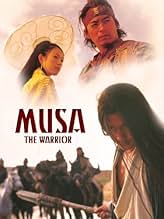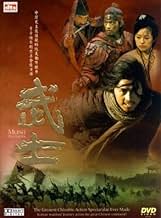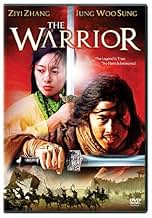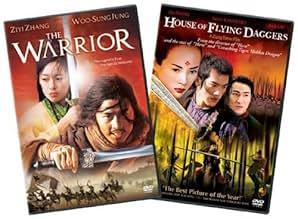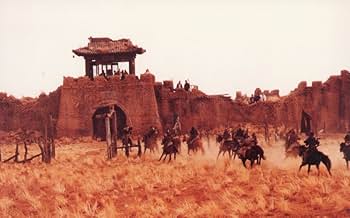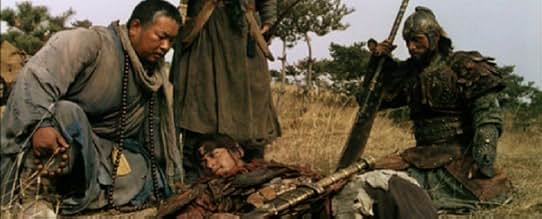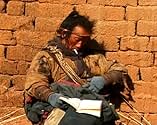IMDb रेटिंग
7.1/10
11 हज़ार
आपकी रेटिंग
इंपीरियल चीन द्वारा निर्वासित नौ कोर्यो योद्धा मंगोलियाई सैनिकों से एक चीनी मिंग राजकुमारी की रक्षा के लिए लड़ाई करते हैं.इंपीरियल चीन द्वारा निर्वासित नौ कोर्यो योद्धा मंगोलियाई सैनिकों से एक चीनी मिंग राजकुमारी की रक्षा के लिए लड़ाई करते हैं.इंपीरियल चीन द्वारा निर्वासित नौ कोर्यो योद्धा मंगोलियाई सैनिकों से एक चीनी मिंग राजकुमारी की रक्षा के लिए लड़ाई करते हैं.
- पुरस्कार
- 6 जीत और कुल 11 नामांकन
Ziyi Zhang
- Princess Bu-yong
- (as Zhang Ziyi)
Park Jeong-hak
- Ga-nam
- (as Park Jung-hak)
Jeong Mi-nam
- Yongho Soldier
- (as Mi-Nam Jung)
फ़ीचर्ड समीक्षाएं
Emissaries from Korea stumble across an attempt by Mongol warriors to kidnap a Chinese princess. Nice clean and simple premise for a Summer blockbuster, one whose marketing (and casting) coasts on the popularity of Crouching Tiger and Hero but whose execution is very different.
I saw this one by accident thinking it was Hero, the massive 2002 Oscar nominee also starring Zhang Ziyi (and, for all its dodgy ideology, worth discovering for the visual feast alone). The region 2 (Korean & French audio 5.1) looked good so I rented it... Back when that was still a thing.
First, this is not Hero, nor is it a wuxia or wire-work driven martial arts film. This is a Historical action film, and despite the prowesses of its heroes, Musa's violence is realistic and brutal. It is a very clever men-on-a-mission flick, with interesting balance and variety within the team, with echoes of Seven Samurai. Where things take an even more pleasant turn are in the interesting portrayal of our characters: a borderline unlikable "hero" (or so he seems at first) and princess, great nobility in the lower ranks, and a surprisingly likable and charismatic villain, if indeed you can call him that.
In production value terms, this can compete with anything Hollywood churns out, and the technical credits, from editing to earthy cinematography, are all excellent. Fast-shutter action, made popular by Saving Private Ryan and Gladiator, is put to brutal use here, and there is a fine balance of chaotic individual moments and interesting strategies, something that would later be explored in John Woo's Red Cliff. This film procures that very rare delight of watching a film and knowing exactly where all the money, effort and care went, because it is all up there on screen, and for once, equally distributed, performances included. Something you have got to see.
For your consideration, ladies and gentlemen: Musa.
I saw this one by accident thinking it was Hero, the massive 2002 Oscar nominee also starring Zhang Ziyi (and, for all its dodgy ideology, worth discovering for the visual feast alone). The region 2 (Korean & French audio 5.1) looked good so I rented it... Back when that was still a thing.
First, this is not Hero, nor is it a wuxia or wire-work driven martial arts film. This is a Historical action film, and despite the prowesses of its heroes, Musa's violence is realistic and brutal. It is a very clever men-on-a-mission flick, with interesting balance and variety within the team, with echoes of Seven Samurai. Where things take an even more pleasant turn are in the interesting portrayal of our characters: a borderline unlikable "hero" (or so he seems at first) and princess, great nobility in the lower ranks, and a surprisingly likable and charismatic villain, if indeed you can call him that.
In production value terms, this can compete with anything Hollywood churns out, and the technical credits, from editing to earthy cinematography, are all excellent. Fast-shutter action, made popular by Saving Private Ryan and Gladiator, is put to brutal use here, and there is a fine balance of chaotic individual moments and interesting strategies, something that would later be explored in John Woo's Red Cliff. This film procures that very rare delight of watching a film and knowing exactly where all the money, effort and care went, because it is all up there on screen, and for once, equally distributed, performances included. Something you have got to see.
For your consideration, ladies and gentlemen: Musa.
I'd never heard of this movie until my buddy Eric rented it; that Blockbuster carries it is I guess a good sign. Part Crouching Tiger, part Saving Private Ryan, with just a smidgen of Hidden Fortress and an echo of Xenophon, Musa is a highly enjoyable movie.
The movie begins in 1375 with a failed delegation from Korea to the Ming dynasty. Led by General Choi Jung (Jin-mo Ju), the delegation become prisoners of the Ming, being led off to exile, when the Mongols strike. Suddenly finding themselves free, the delegation decides to rescue the captive Ming princess (Ziyi Zhang, of Crouching Tiger fame) who travels with the Mongols. When they succeed, naturally, the Mongols want her back, and thus begins an arduous trek across the desert, culminating in a Road Warrior-esque fight at a battered old castle where the survivors hole up against their much more mobile but less-civilized attackers.
Musa has action in spades, some of it exceptionally grisly (every archery attack is cause for dozens of shots of gruesome impalings). The battles are tense and tautly filmed and feel more dangerous than most combats of this type. We eschew the beautiful martial arts style so prevalent in many Hong Kong films for a grittier and far more realistic, if a bit bloody, style here. But what Musa also possesses is atmosphere; the locations and the cinematography are top-notch, from the boundless deserts to the broken-down castle by the sea. Musa does an excellent job of selling the world it is set in.
The costumes help with this as well. Not since Brotherhood of the Wolf have I seen such elaborate and effective costuming (the armor and such here was even more intricate and character-intensive than Last Samurai, which is saying something). Each character has his own particular look, is easily told apart from the others, and costuming is ultimately an extension of character, which to me has always been the whole point. These are some of the best period costumes you'll see anywhere.
The acting is all pretty good, though it tends to come from the George Lucas school of `faster, more intense.' One facet I did like is that no one is perfect; the general is a bit of a jerk; his loyal retainer Ga-nam (Jeong-Hak Park), while a mighty warrior, lacks the ability to really think for himself; the princess is spoiled; the slave-turned-warrior Yeo-sol (Woo-sung Jung) is selfless but headstrong, and so on. Even the Mongols come across as human, if a bit savage (which, having done the research, I can attest is more or less pretty accurate).
Musa isn't for everyone due to the violence. But it's a very well done period piece with wonderful visuals that certainly captivates the viewer. It's as good or better than any of the historical epics Hollywood has released in the past few years (with the exception of The Last Samurai), and from a costuming and cinematography sense is very much worth your while to see. Just don't bother tracking this down if you're a little squeamish, that's all.
The movie begins in 1375 with a failed delegation from Korea to the Ming dynasty. Led by General Choi Jung (Jin-mo Ju), the delegation become prisoners of the Ming, being led off to exile, when the Mongols strike. Suddenly finding themselves free, the delegation decides to rescue the captive Ming princess (Ziyi Zhang, of Crouching Tiger fame) who travels with the Mongols. When they succeed, naturally, the Mongols want her back, and thus begins an arduous trek across the desert, culminating in a Road Warrior-esque fight at a battered old castle where the survivors hole up against their much more mobile but less-civilized attackers.
Musa has action in spades, some of it exceptionally grisly (every archery attack is cause for dozens of shots of gruesome impalings). The battles are tense and tautly filmed and feel more dangerous than most combats of this type. We eschew the beautiful martial arts style so prevalent in many Hong Kong films for a grittier and far more realistic, if a bit bloody, style here. But what Musa also possesses is atmosphere; the locations and the cinematography are top-notch, from the boundless deserts to the broken-down castle by the sea. Musa does an excellent job of selling the world it is set in.
The costumes help with this as well. Not since Brotherhood of the Wolf have I seen such elaborate and effective costuming (the armor and such here was even more intricate and character-intensive than Last Samurai, which is saying something). Each character has his own particular look, is easily told apart from the others, and costuming is ultimately an extension of character, which to me has always been the whole point. These are some of the best period costumes you'll see anywhere.
The acting is all pretty good, though it tends to come from the George Lucas school of `faster, more intense.' One facet I did like is that no one is perfect; the general is a bit of a jerk; his loyal retainer Ga-nam (Jeong-Hak Park), while a mighty warrior, lacks the ability to really think for himself; the princess is spoiled; the slave-turned-warrior Yeo-sol (Woo-sung Jung) is selfless but headstrong, and so on. Even the Mongols come across as human, if a bit savage (which, having done the research, I can attest is more or less pretty accurate).
Musa isn't for everyone due to the violence. But it's a very well done period piece with wonderful visuals that certainly captivates the viewer. It's as good or better than any of the historical epics Hollywood has released in the past few years (with the exception of The Last Samurai), and from a costuming and cinematography sense is very much worth your while to see. Just don't bother tracking this down if you're a little squeamish, that's all.
Those who settle down to enjoy the excellent 150-odd minute Musa will be surprised at how much it suggests a Western. There's sweeping landcapes, a cross-desert ordeal; competition between villains and heros, 'stagecoach' chases, abandoned and defended forts, and 'cavalry' charges. These, as well as a strong sense of a man-having-to-do what-a-Man-has-to-do, combine to create familiarity to those who know such films as (for instance) The Alamo and Commanche Station. That's not to say that Musa has no originality, or is not strongly rooted within Korean national cinema. It contains a number of striking set pieces - notably the several pitched battle scenes, multiple characterisation, as well as some insight into the various power struggles which make up mid-fourteenth century Asian history. But at the heart of this package remain a well-tried fairy story, that of a cold Princess who must learn to swallow her pride, and of a brave servant's unrequited love.
Sung-Su Kim, who directs from his own screen play, does a very good job in drawing together his disparate group of travelling companions on a dangerous journey: a Princess, a General, a monk, soldiers, wives, a cowardly translator, a whore, etc. To provide suitable contrast between the moments of combat, he relates them in short, effective, dialogue scenes. Its good to see a film too in which the ubiquitous wire work and over the top gymnastics, beloved by some Eastern action directors, is conspicuous by its absence. Its also one where the director relies less on extreme camera angles and special effects to create visual drama than on the regular ebb and flow of dramatic editing. Perhaps because of this 'naturalness', the battle scenes are consistently exciting and involving. They are also staged in enough different locales to make them varied viewing each time. A standout is a desperate confrontation amongst trees, where the director takes full advantage of foliage cover, confusion, and events within the frame to create some real martial suspense.
The HK disc I saw was generally excellent, with occasional errors in subtitle grammar, as well as the odd compression problem (on-screen blur), usually during horizontal tracking movements. All told, though, the cheap price of this disk makes it an excellent buy and I strongly recommend it - and the film.
Sung-Su Kim, who directs from his own screen play, does a very good job in drawing together his disparate group of travelling companions on a dangerous journey: a Princess, a General, a monk, soldiers, wives, a cowardly translator, a whore, etc. To provide suitable contrast between the moments of combat, he relates them in short, effective, dialogue scenes. Its good to see a film too in which the ubiquitous wire work and over the top gymnastics, beloved by some Eastern action directors, is conspicuous by its absence. Its also one where the director relies less on extreme camera angles and special effects to create visual drama than on the regular ebb and flow of dramatic editing. Perhaps because of this 'naturalness', the battle scenes are consistently exciting and involving. They are also staged in enough different locales to make them varied viewing each time. A standout is a desperate confrontation amongst trees, where the director takes full advantage of foliage cover, confusion, and events within the frame to create some real martial suspense.
The HK disc I saw was generally excellent, with occasional errors in subtitle grammar, as well as the odd compression problem (on-screen blur), usually during horizontal tracking movements. All told, though, the cheap price of this disk makes it an excellent buy and I strongly recommend it - and the film.
Someone insulted the Korean movie industry by stating this is one of Korea's best films. I must be honest, I couldn't get myself to see the entire movie, which is a rarity for me. By the time I decided to stop torturing myself the following had occurred in the movie.
1)The tempermental and rebellious "hero" who has a serious self control problem gets the entire ancient Korean Caravan in trouble with his psychotic propensity towards violence. The Caravan saves themselves and the hero with cunning and wit. 2)The "hero" puts the entire Caravan in jeopardy again by cutting off the head of one of the merchants. This time many Caravan members die but they still escape relatively intact. 3)The Caravan finds a way to escape from their dire situation but the "hero" puts an end to their salvation by doing something totally stupid and irrational. Again, the great leadership, solidarity, and fighting ability of the Caravan saves them from disaster.
By this time, I began to beg someone to have the senses to kill the "hero" who was getting everyone else killed with his irresponsible actions. Instead of languishing in frustration, I decided to use my remote control.
The "hero" is played by Jung Woo Sung, one of the worst, and yet one of the most popular, actors in Korea. The only characters he usually plays are the silent rebellious types who act angry all the time, probably to hide his lack of acting ability.
This was the most expensive movie made in Korea (few films have surpassed it since). Yet it was a box office bomb, and with a good reason.
1)The tempermental and rebellious "hero" who has a serious self control problem gets the entire ancient Korean Caravan in trouble with his psychotic propensity towards violence. The Caravan saves themselves and the hero with cunning and wit. 2)The "hero" puts the entire Caravan in jeopardy again by cutting off the head of one of the merchants. This time many Caravan members die but they still escape relatively intact. 3)The Caravan finds a way to escape from their dire situation but the "hero" puts an end to their salvation by doing something totally stupid and irrational. Again, the great leadership, solidarity, and fighting ability of the Caravan saves them from disaster.
By this time, I began to beg someone to have the senses to kill the "hero" who was getting everyone else killed with his irresponsible actions. Instead of languishing in frustration, I decided to use my remote control.
The "hero" is played by Jung Woo Sung, one of the worst, and yet one of the most popular, actors in Korea. The only characters he usually plays are the silent rebellious types who act angry all the time, probably to hide his lack of acting ability.
This was the most expensive movie made in Korea (few films have surpassed it since). Yet it was a box office bomb, and with a good reason.
10skduncan
Based on actual events, Korean diplomats were sent into China with military escorts in 1375. Remember Europe was emerging from the Dark Ages at this time, but in Asia they were an advanced civilization. With the rise of the famous Ming Dynasty in China and the waning days of the Mongols, the Korean emperor was eager to formalize ties with the new Chinese government. This is the story of one of the those diplomatic missions.
This is an epic film, shoot over 9000 miles of China's northern region. Covering plains, prairies, forests, deserts and coastline. The cinematography is beautiful.
Though this is a Korean film, it utilizes the famous Chinese actress Zhang Ziyi, who portrays a kidnapped daughter of the Chinese Emperor.
Throughout most of the film the Korean warriors speak Korean. The Princess and the Chinese villagers speak Mandarin. Interestingly the Mongols also speak Mandarin to each other, historically inaccurate but Mongols don't go to movies these days. Some of the Koreans can also speak Mandarin. This is accurate since the educated Koreans of the time, could read, write and speak Chinese. This film is subtitled in English.
This is a grand story of honor, sacrifice and overcoming overwhelming odds. The Korean warriors must fight the larger forces of the Mongols. Using tactics and strategies not unlike that which you can find in Sun Tzu's the Art of War writings.
If you want some insight into the culture and attitudes of the people of this region, Musa is the movie for you.
This is an epic film, shoot over 9000 miles of China's northern region. Covering plains, prairies, forests, deserts and coastline. The cinematography is beautiful.
Though this is a Korean film, it utilizes the famous Chinese actress Zhang Ziyi, who portrays a kidnapped daughter of the Chinese Emperor.
Throughout most of the film the Korean warriors speak Korean. The Princess and the Chinese villagers speak Mandarin. Interestingly the Mongols also speak Mandarin to each other, historically inaccurate but Mongols don't go to movies these days. Some of the Koreans can also speak Mandarin. This is accurate since the educated Koreans of the time, could read, write and speak Chinese. This film is subtitled in English.
This is a grand story of honor, sacrifice and overcoming overwhelming odds. The Korean warriors must fight the larger forces of the Mongols. Using tactics and strategies not unlike that which you can find in Sun Tzu's the Art of War writings.
If you want some insight into the culture and attitudes of the people of this region, Musa is the movie for you.
क्या आपको पता है
- ट्रिवियाDuring filming in China, Woo-sung Jung got knee-injury while shooting one of his fight scenes and had to stay behind after the Korean crew came back to Korea.
- भाव
Princess Bu-yong: You could have killed me! I am a Princess!
Yeo-sol: Stop yelling at me! Don't think you can do anything you like just because you are a Princess!
Princess Bu-yong: Unhand me!
[English translation subtitles from Mandarin Chinese in Korean language film]
- इसके अलावा अन्य वर्जनInternational version runs ca. 25 minutes shorter.
टॉप पसंद
रेटिंग देने के लिए साइन-इन करें और वैयक्तिकृत सुझावों के लिए वॉचलिस्ट करें
विवरण
बॉक्स ऑफ़िस
- बजट
- BND 80,00,000(अनुमानित)
- दुनिया भर में सकल
- $9,45,922
- चलने की अवधि
- 2 घं 38 मि(158 min)
- रंग
- ध्वनि मिश्रण
- पक्ष अनुपात
- 2.35 : 1
इस पेज में योगदान दें
किसी बदलाव का सुझाव दें या अनुपलब्ध कॉन्टेंट जोड़ें





